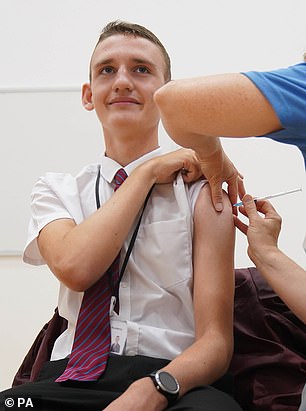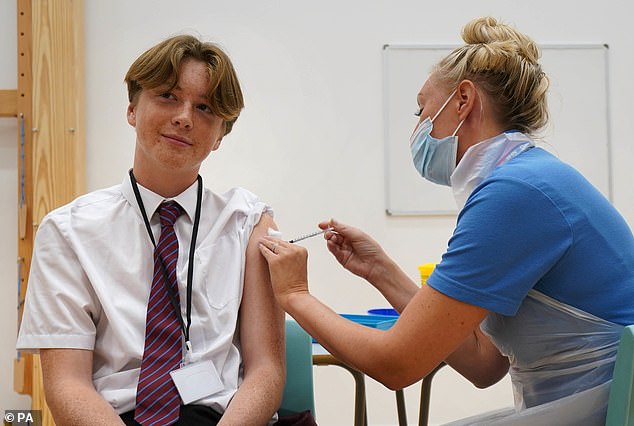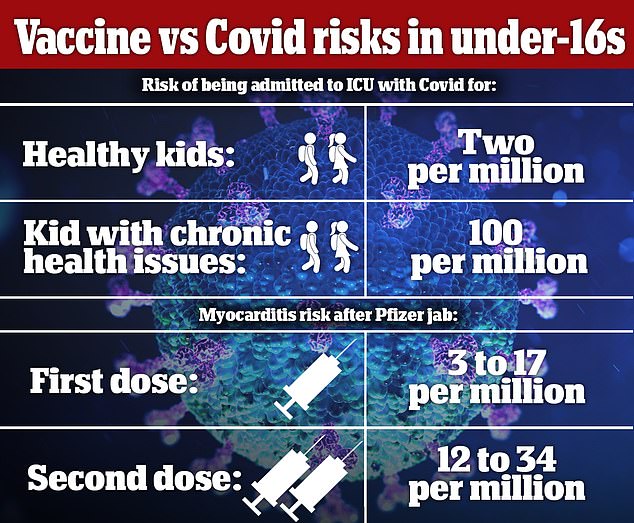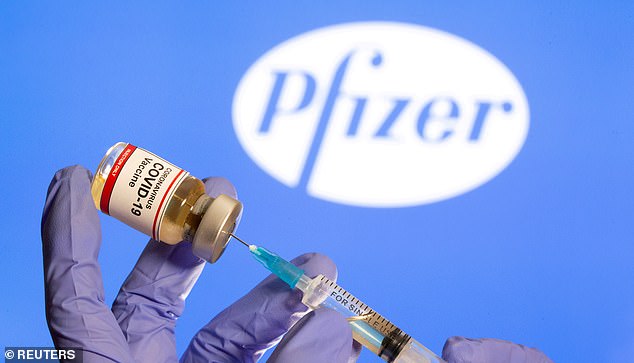
Fourteen-year-old Jack Lane became one of the first to benefit from the extension of Britain’s jab rollout today. He received his vaccination at Belfairs Academy in Leigh-on-Sea, Essex
Pfizer will push for its Covid vaccine to be approved for children as young as five, the company announced today — as Britain began injecting healthy 12 to 15-year-olds with the jab for the first time.
The pharmaceutical giant said its trial of around 2,000 children aged five to 11 found a low dose of the vaccine generated a strong immune response and threw up no safety concerns.
American officials are set to review the data in the coming weeks and decide whether to roll out the vaccine to pre-teens in October, with Pfizer also planning to seek authorisation in Europe and the UK.
Pfizer’s trial looked at antibody levels in the blood of primary school-aged children to estimate their immune response, unlike larger trials of older participants which compared Covid cases in the vaccine and control groups.
A spokesperson said the company may later disclose vaccine efficacy from the trial but there had not been enough infections yet among the volunteers.
Pfizer is also trialling its vaccines on babies as young as six months and expects the results of that study to be available by winter, in a move likely to cause international controversy.
While the US is expected to open the vaccination programme to younger groups, at this stage the jab is unlikely to see the same sweeping approval in the UK, which only today started immunising healthy children aged 12 and above.
A single dose of Pfizer’s vaccine is being used on Britons aged 12 to 15 in the hope that the roll-out will prevent further disruptions to their education, even though Uk officials say the direct health benefits are only ‘marginal’.
Parental consent is being sought but children can overrule parents who do not want them to get the jab if deemed ‘competent’, in a move that has caused controversy. More than 3million under-16s are eligible for the vaccines and ministers expect at least 60 per cent to take up the offer.
Jack Lane, 14, was one of the first to be vaccinated in England, as part of the extended rollout. After having his vaccine in Leigh-On-Sea in Essex this morning, he said: ‘I am proud to have had my vaccination so that I can remain in school and continue in my education – the jab was quick, easy, and painless.’

Fifteen-year-old Quinn Foakes receiving a Covid-19 vaccination at Belfairs Academy in Leigh-on-Sea, Essex

Earlier this month the JCVI said it could not recommend Covid jabs for healthy 12 to 15-year-olds because the direct benefit to their health was only marginal. It also looked at the risk of health inflammation – known as myocarditis – in young people given the Pfizer vaccine, which was still very small but slightly more common after a second dose

Pfizer announced Monday that its COVID vaccine is safe for children aged between five and 11
The vaccine made by Pfizer and its German partner BioNTech is currently available for anyone 12 and older.
But the firms say the Delta variant and a sharp rise in paediatric cases in the US justified rolling the jab to younger groups.
For its latest study, Pfizer gave 2,268 children between the ages of five and 11 two shots of a lower dose of vaccine.
Youngsters were given 10 micrograms — a third of the dosage given to over-12s — in each of their two injections.
A press release today said that after their second dose, children developed Covid-fighting antibody levels just as strong as teenagers and young adults. The full results have not been made public yet.
The lower dosage also proved safe, with similar or fewer temporary side effects – such as sore arms, fever or achiness – that teens experience, the company said.
Pfizer’s chief executive Albert Bourla added: ‘We are eager to extend the protection afforded by the vaccine to this younger population, subject to regulatory authorization, especially as we track the spread of the Delta variant and the substantial threat it poses to children.
Revealed: The logistics of vaccinating over-12s in schools
How will it work?
The NHS has already been asked to prepare to offer Covid vaccines to 3million 12 to 15-year-olds.
Doses will mostly be administered through the school vaccination programme, which manages HPV and flu inoculations in schools every year.
Official figures showed almost 90 per cent of children offered the HPV vaccine every year take it.
Children will likely receive their vaccines in suitable areas such as school halls. They will be delivered by nurses, healthcare support workers and administrative staff.
Parents are set to receive a letter revealing the plans for jabbing kids in the coming days, No10’s vaccine minister Nadhim Zahawi revealed today. They will also be asked to consent to their child receiving the vaccine.
Will it need parental consent?
Under-16s are not automatically presumed to be legally competent to make decisions about their healthcare and, therefore, whether they should get the Covid jab.
But the courts have previously ruled that under-16s are competent to give consent to an intervention if they have ‘sufficient understanding and intelligence to understand fully what is proposed’.
This is known as the ‘Gillick test’, and has been in place since the 1980s.
The test is normally carried out by a medical professional or nurse, who assesses the child’s maturity, and their understanding of the advantages, disadvantages and potential long-term impacts of vaccination. They then give a view on whether the child is competent to consent to vaccination.
Can children overrule their parents?
Mr Zahawi said today that children as young as 12 could be able to overrule their parents to get the vaccine.
But he admitted this was likely to be a ‘very rare occurrence’ for the youngest children. He also said parents should not be ‘stigmatised’ if they are hesitant about their children being vaccinated.
Mr Zahawi said children would only be able to choose to have the coronavirus vaccine against their parents’ wishes following a meeting with a clinician.
The deputy head of the JCVI Professor Anthony Harnden said there was ‘sliding scale’ of competency, meaning it would be easier for a 15-year-old to overrule their parents than a 12-year-old who is ‘less likely to be deemed competent’.
Professor Chris Whitty said, in terms of medical consent: ‘In the majority of cases, children and their parents come to the same decision.’
Advertisement
‘Since July, paediatric cases of Covid-19 have risen by about 240 per cent in the US – underscoring the public health need for vaccination.’
The study isn’t large enough to detect any extremely rare side effects, such as the heart inflammation that affects fewer than one in 10,000 people and is more common after the second dose.
A single dose Pfizer’s jab is being offered to children in the UK due to concerns about side effects and a lack of long term safety data.
The vaccines are being administered at some schools in England today and the rollout is due to begin in Scotland and Wales later this week. In Northern Ireland, the head of the region’s vaccination programme said jabs are likely to be offered in schools from October.
The British scientific community has been split over vaccinating healthy children against Covid because the virus poses such a low risk to them.
No10’s own advisory panel said earlier this month that immunising them would only provide ‘marginal’ benefit to their health, and not enough to advise a mass roll
But Professor Chris Whitty and the chief medical officers in the devolved nations came down in favour of expanding the inoculation drive after weighing up the wider benefits to children.
They said hundreds of thousands of school absences could be prevented and school closures averted if there was good uptake of the vaccines.
Health and Social Care Secretary Sajid Javid said: ‘It’s encouraging to see 12-15 year olds starting to get their vaccinations today – reflecting our ongoing commitment to protect young people from COVID-19 and minimise any disruption to their education.
‘The vaccine has made a significant difference in saving lives and reducing transmissions, and has met the strict standards of safety and effectiveness of our renowned medicines regulator for those aged 12 and over.
‘Today is the culmination of the fantastic preparation work the NHS has put in place to ensure vaccines can be given as safely and quickly as possible.’
The roll-out in England will primarily be done in schools through the in-school vaccination service teams that already carry out routine vaccine programmes for illnesses like flu.
Schools will be used as a site for administering the vaccines and distributing consent and information forms to pupils and guardians.
Teachers have been told not to hesitate in phoning police to deal with anti-Covid vaccine campaigners amid fears of protests at school gates over the rollout.
Dr Nikki Kanani, GP and deputy lead for the NHS Covid-19 Vaccination programme, said: ‘Alongside one of our busiest summers, NHS staff have been working closely with schools to ensure they are ready to deliver the vaccine to children aged 12-15 who are now eligible.
‘Following the decision by government, and building on the success of the NHS Covid-19 vaccination programme which has delivered over 77 million vaccinations, the NHS will now roll out to hundreds of schools over the next few days.
‘The vaccine is safe and effective and I would urge families to work closely with their schools based vaccination team to get their loved ones vaccinated when they are invited to protect themselves and their families ahead of the winter period.’
An expert advising on jabs urged parents to be tolerant of one another when it comes to deciding whether to have their children vaccinated against coronavirus.
Professor Adam Finn, a paediatrician and member of the Joint Committee on Vaccination and Immunisation (JCVI), said the decision on whether to jab 12 to 15-year-olds is not black and white.
He added that while it is not ‘essential’ for them to have a coronavirus vaccine, it is also ‘perfectly sensible’ for them to do so.
The JCVI decided not to recommend mass vaccination of 12 to 15-year-olds on health grounds alone, but the expert panel suggested that wider issues, such as disruption to education, should be taken into consideration and examined by the UK’s four chief medical officers.
Those health chiefs subsequently said a single dose of Pfizer for people in this age group will significantly reduce the chance of a young person getting Covid and passing the virus on.
Professor Finn, speaking at the weekend on BBC Breakfast, said the reason the process for deciding whether to vaccinate children of this age has been ‘convoluted and complex’ is because there ‘isn’t a completely clear, straightforward answer’.
But he added that people should not become too ‘agonised’ about it because the risks on either side ‘are not that high’, explaining that children of this age are not at great risk from Covid, nor at great risk from the vaccine.
Parental consent will not be needed if a child is considered competent to make a decision by themselves, but England’s chief medical officer Professor Chris Whitty has said for the ‘great majority of cases, children and their parents come to the same decision’.
It comes as booster jab invites are being sent out to 1.5million people in England this week in what Health Secretary Sajid Javid said was an effort to ‘strengthen the wall of defence’ against coronavirus created by the vaccines.
Source link : https://www.dailymail.co.uk/news/article-10009087/Pfizer-says-Covid-vaccine-safe-children-age-FIVE-pushes-approval.html











